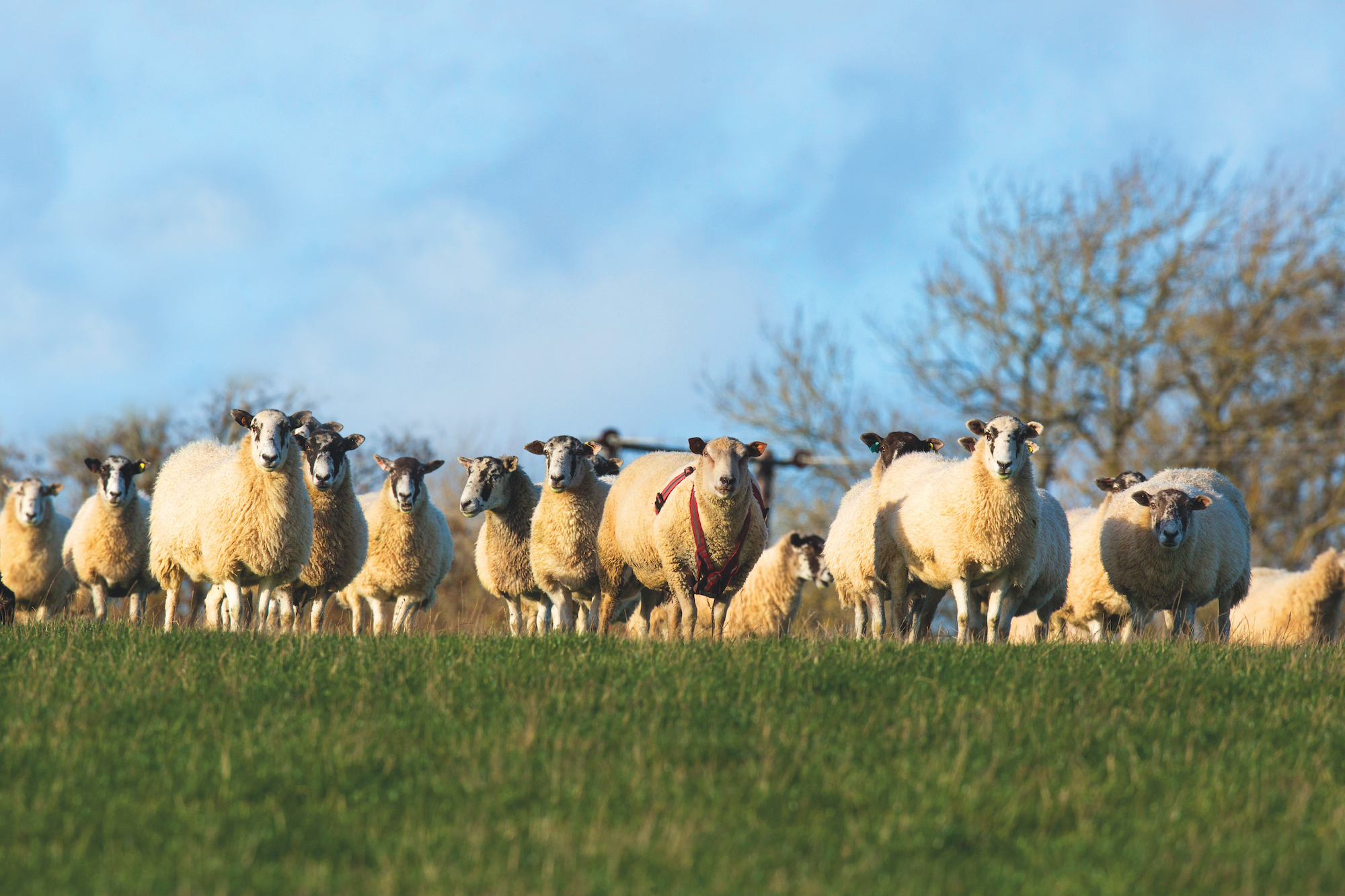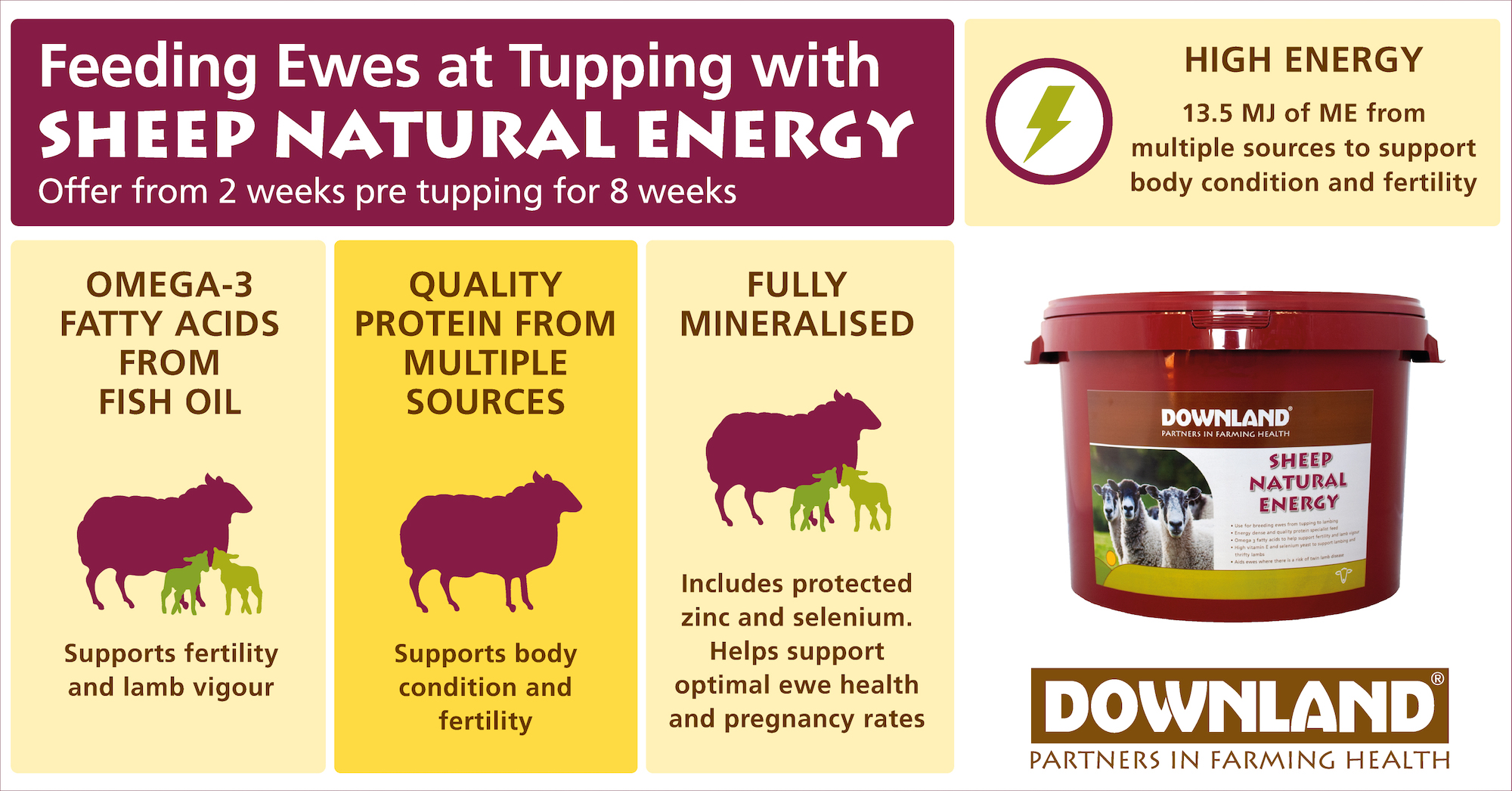Support tupping success with a natural energy feed
5th October 2021
The dry April followed by one of the wettest and coolest Mays on record resulted in a slow start to the grazing season. As a consequence, ewe body condition score (BCS) will have suffered, and it is likely that ewes will be below target for the time of year due to having to draw on body fat reserves for milk production. Downland experts explore options for supplementation…
The length of time taken for the ewe’s ovary to mature means nutrition and BCS can influence ovulation as much as six months before mating. Unless management plans are put in place now for weaning, and beyond, this year’s spring grazing may affect next year’s lambing percentage and profitability.
Maximising lamb output with the sale of strong and healthy lambs at a good price is the ultimate goal for every sheep producer. Yet, with an average scanning percentage of just 170% in the UK flock, there are opportunities to improve. Farmers should be aiming for more than 75% of ewes holding to first service, this tightens the lambing period and eases management and feeding further down the line. Similarly, they should also be aiming for less than 2% of ewes barren.
A key factor involved in maximising lambing percentages and number of ewes holding to first service is BCS at tupping time. It is recommended that lowland and hill ewes are BCS 3.5 and 2.5 respectively when going into the tup, this helps to support optimal ovulation rates and ensure pregnancy success. Typically, lambs are weaned 8-10 weeks pre-tupping to allow ewes to recover and gain BCS if required. It is estimated that ewes require at least 6-8 weeks of good quality grazing (>10.5 ME MJ/kg DM) to gain 1 BCS.
However, if ewes are required to increase the condition score by more than one, where grazing is limited, or poor quality then further time can be required, and early weaning should be considered. Furthermore, late summer/autumn grazing alone may not be able to provide all that is required, even when grass growth conditions have been favourable. Grass quality and quantity tends to peak around late June after which time supplementation may be required to balance energy and vital nutrient supply including minerals, vitamins and trace elements.
Supplementation in the period from weaning through to mating can support grass utilisation and ensure ewes reach the optimum body condition for tupping. Energy in the diet is important to ensure that ewes cycle and subsequently hold to service. Furthermore, providing additional minerals, vitamins and trace elements will help ensure deficiencies are not an issue on the approach to tupping.
Alternatively, supplementation only over the mating period, from two weeks prior to introducing the tup for a total of eight weeks will support the ewe during early pregnancy when embryo implantation occurs. Supplementing ewes at this time will help maintain nutrition levels during and after mating when grazing quality typically declines, whilst also providing additional minerals, vitamins and trace elements in particular cobalt and selenium, all of which help to support this critical process in early pregnancy.
On-farm trials have shown that offering supplementation to ewes during this critical period can increase lambing percentage by up to 22% when compared to no supplementation. Furthermore, the maintenance of BCS during tupping and pregnancy will have positive effects on both lamb health and performance.
Downland Sheep Natural Energy is an extra high energy feed and mineral bucket suitable for ewes and tups during the tupping period. It contains 13.5 ME (MJ/kg DM) from a range of energy sources which supports rumen health, maximum forage utilisation and ewe body condition. Sheep Natural Energy also contains 16.5% all-natural protein and a range of minerals, vitamins and trace elements, including selenium, cobalt, protected zinc and vitamin E to support stock at grass and fertility. Finally, Sheep Natural Energy also contains fish oil as a source of omega-3 fatty acids. This supports optimal health, fertility and performance in breeding ewes and tups.
Proper preparation will always offer a better opportunity of success and therefore, preparing ewes for the crucial tupping period is critical.
To find your local Downland retailer CLICK HERE.


